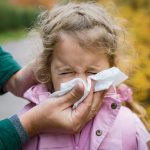The Importance of Understanding Allergies in Children
Allergies in children are not just a mere inconvenience; they represent how the young immune system grapples with foreign substances. From a simple runny nose to a life-threatening severe allergic reaction, these responses can range in their intensity and implications.
Allergy symptoms in our young ones often lead parents into a spiral of worry, given the vulnerability of children and their still-developing immune systems. However, not every runny nose or watery eye should sound the alarms. Some reactions might be milder and easier to manage, like mild symptoms, while others may need immediate medical attention.
At Metro Pediatrics we have experienced pediatricians who have helped countless families through the process of managing and understanding their child’s allergies. Our medical expertise is reinforced by a genuine commitment to ensure the well-being and comfort of every child we serve.
The type of allergy a child may experience is broad, encompassing everything from food to seasonal plants, dust, dander, toxins, and more. In this guide, we’ll equip you with the information to differentiate, manage, and respond to various allergic reactions your child might encounter. Metro Pediatrics is here so you’re never navigating this journey alone.
Distinguishing Between Food Allergy and Food Intolerance
It’s only natural to be concerned when you observe your child’s face turning splotchy after devouring a spoonful of peanut butter or their tummy aching a little too much after a lactose-rich drink. Yet, we understand that not all adverse reactions to food signify a food allergy. Sometimes, it might be food intolerance. Understanding the distinction is crucial for ensuring the right course of action for your child.
Food Allergy
This is when the body’s immune system perceives a particular food as harmful and reacts by producing IgE antibodies. These antibodies trigger a series of responses leading to various symptoms, some of which can be severe. Common culprits include tree nuts, peanuts, and several other foods. An actual food allergy can lead to an allergic reaction, encompassing symptoms ranging from a mere itch to more alarming signs like difficulty in breathing.
Food Intolerance
Unlike food allergies, food intolerance doesn’t involve the immune system. It usually happens when a child’s gastrointestinal tract fails to break down and digest certain foods properly. Symptoms of food intolerance might mimic some allergy symptoms but are often restricted to digestive problems. For instance, lactose intolerance results from the body’s inability to digest lactose, leading to bloating and diarrhea.
A food allergy involves the body’s immune system and can be life-threatening, while food intolerance is generally less severe, affecting mainly the digestive system. While both food allergy and food intolerance can manifest after the consumption of food, their origins and implications differ vastly.
Moreover, food allergies often show up soon after the food is consumed, making them somewhat easier to spot. Reactions might include hives, a swollen tongue, or even a severe allergic reaction, known as anaphylaxis. On the other hand, food intolerance symptoms might take longer to surface, sometimes several hours post consumption.
Given the significant differences and the high stakes involved, especially with potential severe allergic reactions, it’s important to consult with your child’s pediatrician or a healthcare provider if you suspect any adverse food reactions. Metropolitan Pediatrics is well-equipped to help parents understand how to manage their child’s food allergies or intolerances.
Signs, Symptoms, and Response to Severe Allergic Reactions in Children
Raising children is a beautiful blend of joyous moments and vigilance. When it comes to allergies, this vigilance becomes a top priority. While many allergic reactions are mild, manifesting as a sneeze or an itch, there are some reactions that warrant immediate attention. Recognizing and responding to severe allergic reactions can be the critical difference between a minor scare and a life-threatening situation.
Recognizing Severe Allergy Symptoms
Every parent should be aware of the signs that indicate a severe allergic reaction, commonly referred to as anaphylaxis. This swift and intense reaction can affect multiple systems in the body. Symptoms can include:
- Difficulty breathing, where the child feels like their throat is closing up.
- A sudden drop in blood pressure, leading to dizziness or fainting.
- Rapid or weak pulse.
- Skin reactions, including hives, along with a redness or a pale appearance.
Such symptoms can manifest within minutes after exposure to an allergen, be it a bite from a particular insect or a morsel of a food allergen like tree nut or peanut butter.
The Role of Epinephrine Auto-Injector
Timing is crucial when dealing with anaphylactic reactions. An epinephrine auto-injector, often known by its popular brand names, is a device that delivers a dose of medication to halt the progression of the reaction. If your child has been diagnosed with a severe allergy, always have this auto-injector nearby. It’s also important that parents and all caregivers know how to use it promptly and efficiently.
Seeking Immediate Medical Help
After administering epinephrine, your child must get to an emergency room or medical facility quickly. Anaphylaxis is severe, and even if symptoms subside post the epinephrine injection, medical evaluation is mandatory.
The Central Role of Your Child’s Pediatrician
Your child’s doctor plays an important role in guiding you through the maze of allergies. From helping identify potential severe allergens through allergy testing, to educating families about managing emergencies, your pediatrician is your partner in ensuring your child’s safety. At Metro Pediatrics, we’re experienced with childhood allergies, offering education, resources, and assurance that we’re here when you need us.
Being prepared is half the battle with allergies. To ensure your child is protected, parents should have the knowledge about severe allergic reactions, coupled with proactive measures, and the support of healthcare professionals.
Seasonal Allergies in Children: Beyond Food
Seasonal allergies, often dubbed as hay fever or allergic rhinitis, are just that – they come and go with the seasons. As trees bloom and grass grows, many children experience an array of symptoms that are not tied to anything they ate.
What Triggers Seasonal Allergies?
Unlike food allergies that are triggered by certain proteins in our diet, seasonal allergies are usually the body’s immune response to airborne allergens. These can include:
- Pollen from trees, grass, and weeds
- Spores released by molds
- Household allergens like dust mites or pet dander
As these allergens find their way into a child’s respiratory tract, they can trigger a reaction. A child’s immune system, recognizing these as intruders, releases histamines leading to allergy symptoms.
Common Symptoms of Seasonal Allergies
These reactions can vary in their intensity but often include:
- Itchy and watery eyes, sometimes accompanied by dark circles
- Nasal congestion, leading to a stuffy or runny nose
- Sneezing
- Itchy nose or throat
- In some children, allergic symptoms might lead to allergic asthma, presenting as coughing, wheezing, and shortness of breath.
Managing Seasonal Allergies
Managing seasonal allergies requires a combination of preventive measures and treatments:
- Limiting Exposure: It might be beneficial to keep windows closed during high pollen seasons and make use of air conditioners. Regularly changing home air filters and keeping indoor environments clean can reduce the presence of allergens.
- Medication: Over-the-counter and prescription allergy medications can provide relief. These can include antihistamines, decongestants, nasal sprays, and even allergy shots or sublingual immunotherapy for more persistent cases. Frequent nasal saline washes can provide some relief by cleansing the nasal passage of allergens. All OTC medications should be approved by your pediatrician before giving them for seasonal allergies.
- Regular Check-ups: Regular visits to your child’s pediatrician can help adjust treatments as needed and ensure that allergy symptoms are under control.
Consulting with Metropolitan Pediatrics: How We Help Manage Your Child’s Allergies
At Metro Pediatrics, we understand and respect the challenges seasonal allergies present to kids and their families. It’s not just about the physical discomfort, but also about making sure that allergies don’t hinder a child’s day-to-day activities. Relieving kids of the symptoms of allergies can help them enjoy every season, despite pollen counts. After all, every child deserves to play in the park with their friends on a sunny day, without the frustration of sneezes or itchy eyes.
The Allergy Testing Process
Identifying the root cause of allergic reactions is the first step towards effective management. This is often done by taking a detailed history of symptoms and when they occur. If that is not enough to identify the cause(s), ask your pediatrician if comprehensive allergy testing is necessary, which includes:
- Blood Tests: These tests measure the level of specific IgE antibodies in the blood, providing insights into potential allergens.
- Skin Prick Tests: By introducing a small amount of an allergen on the skin, we can gauge the body’s reaction, aiding in the identification of specific triggers.
These tests, conducted in a safe and controlled environment, can provide invaluable information that helps tailor treatment plans for each child.
Personalized Allergy Management
Every child is unique, and so is their response to allergens. We tailor our treatment approach, based on the patient and their family lifestyle.
- Personalized treatment plans, from recommending specific allergy medicines to guidance on environmental changes
- Regular follow-ups to ensure treatments remain effective and adapt as your child grows
- Guidance on voluntary measures, ensuring that every recommendation is backed by medical research and proven methodologies
Navigating your child’s allergies can sometimes feel overwhelming. But with Metro Pediatrics, you’re not alone. Your child’s well-being is our foremost priority, and we are committed to ensuring they lead a life unhindered by allergies.
Are you a new patient looking for pediatric care? Contact us today to get started.









